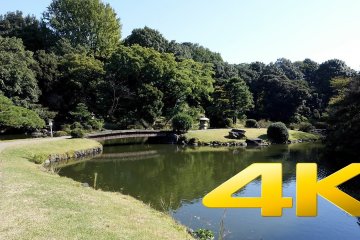
Shinjuku Gyoen
Gonzague Gay-BoucheryCredited as one of the most beautiful parks in Tokyo, Shinjuku Gyoen is definitely another place to enjoy when visiting Tokyo.

Shinjuku Gyoen is one of the largest and most popular public gardens in Tokyo. The park is just a short walk from the well-known Shinjuku district and is particularly famous for its seasonal cherry blossoms.
Shinjuku Gyoen was created during the Edo period (1603-1867) as the residence of a feudal lord in Tokyo and was later converted into a botanical garden. In 1903 the area was transferred to the imperial family, who used it for recreation. The park was almost completely destroyed in World War II but was eventually rebuilt and reopened as a public park in 1949.
There is a Japanese garden as well as French and English gardens and a greenhouse. There are also several spacious green areas where you can go for a walk and enjoy the cherry blossom or autumn leaves.
A 5-minute walk from Shinjuku-gyoen Mae Station on the Marunouchi Line or Sendagaya Station on the JR Chuo-Sobu Line.

Credited as one of the most beautiful parks in Tokyo, Shinjuku Gyoen is definitely another place to enjoy when visiting Tokyo.
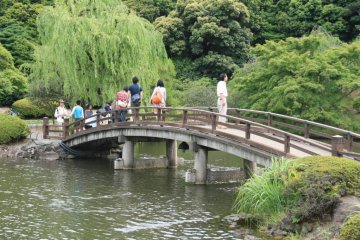
Shinjuku Gyoen is a 58 hectare-park containing three formal garden areas: English, French, & Japanese. It's a pleasure emerging from one theme and happening upon another.
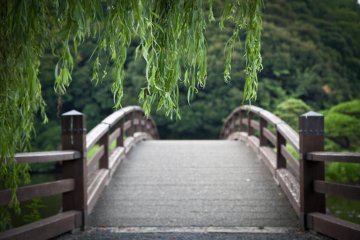
Shinjuku Gyoen is a vast park in the centre of Tokyo boasting an array of trees and flowers as well as a traditional Japanese tea house and garden.

Spring at Shinjuku Gyoen. Tokyo's National Garden comes alive.
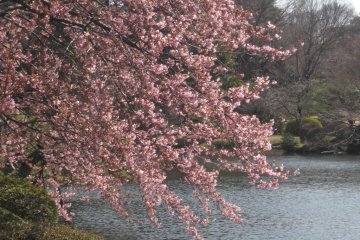
A large and beautifully set out garden within 10 minutes' walk of the world's busiest station. Visit for a few hours of calm before plunging back into the city madness.

Another popular cherry blossom spot is the Shinjuku Gyoen. The park grounds are spacious and Japanese garden landscapes are beautiful.
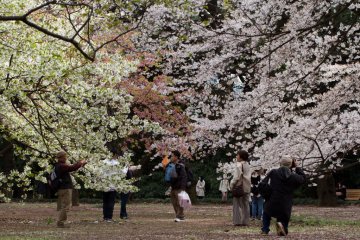
I love Shinjuku Gyoen in Tokyo at any time of the year, but the cherry blossom season is certainly a highlight.
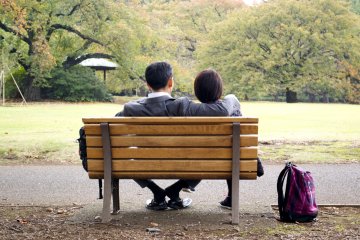
Shinjuku Gyoen in November. The beautiful autumn green, red and orange colors all over this garden will dazzle you!

Sakura photos taken in Shinjuku Gyoen on a bright spring day
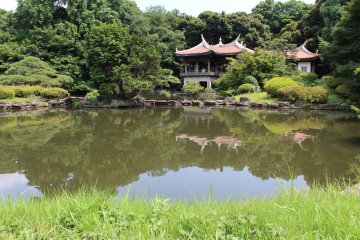
Shinjuku Gyoen is one of the treasures of Shinjuku that should be accredited alongside Shinjuku station and the majestic shiny skyscrapers nearby. It is a very vast park, with Japanese gardens overflowing with oriental charm. It also has a British and French style garden, which contain some lovely flowers. Inside are many fields of grass, the most lucent color of green you could ever imagine. The grass looks so fresh and inviting, so along with a splendid variety of trees, huge amounts of visitors rest on the vast patches to enjoy the park. The park is also home to a greenhouse which contains a lot of interesting flowers and plants. Shinjuku Gyoen is very easy to find from Shinjuku Station and is a beautiful escape from the hustle and bustle of Shinjuku.
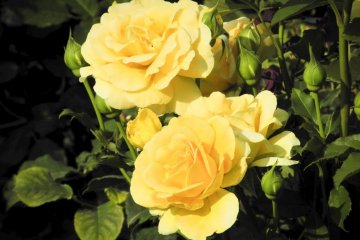
Beautiful botanic life thrives in the heart of Tokyo in Shinjuku Gyoen.

Shinjuku Gyoen National Garden is a spacious and beautiful garden. It can be enjoyed on any day, even if it rains.

The popular Shinjuku Gyoen Greenhouse deserves special attention as it has a large collection of exotic plants.
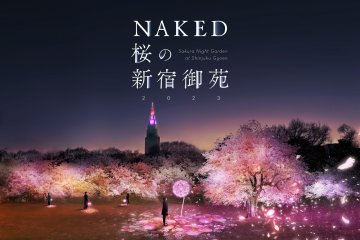
If you're looking for a beautiful way to appreciate cherry blossoms after dark this year, look no further than the first ever event between digital art collective NAKED and Shinjuku Gyoen. Visitors will be able to enjoy real sakura alongside projection mapping versions.
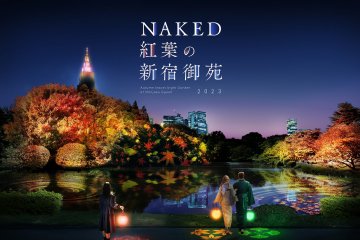
Following on from a hyper-successful springtime cherry blossom event, digital art collective NAKED will be collaborating with Shinjuku Gyoen National Garden this autumn for a fall foliage illumination you shouldn't miss.

As part of an exclusive project by Nippon Travel Agency, private tours of Shinjuku Gyoen, the Formal Imperial Garden, will be held from November 2024 to February 2025.
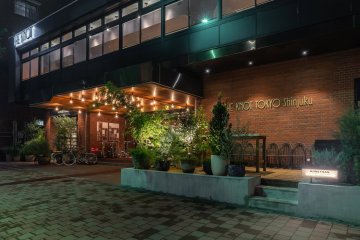
Located right next to Shinjuku Chuo Park, THE KNOT TOKYO Shinjuku is a modern hotel with an exceptional design and easy access to the nearby Shinjuku train station and the Meiji Shrine. The 14-story hotel building was renovated and reopened in August 2018 as THE KNOT TOKYO Shinjuku . The western-style rooms offer a park view on the top floor as well as a newly opened terrace suite. The spacious atrium design offers a relaxed atmosphere and connects the restaurant, bar, lounge and lobby with one another. One of the highlights of THE KNOT is the delicious dishes. There are six areas in which food and drinks are offered. From the grill area to high-quality black tea and fresh bread, everything is on offer.
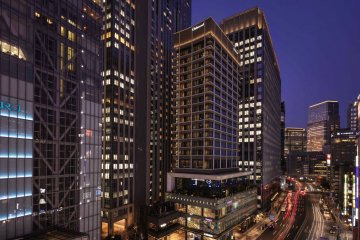
Oakwood Premier Tokyo comes from a brand of standout luxury hotel & service apartments right at the heart of the Tokyo metropolis. It is located in the business hub of Marunouchi with JR Tokyo Station in close proximity. This will allow guests and travelers to easily access the city's extensive transport network and visit various landmarks such as Imperial Palace, Tsukiji Fish Market, Ginza and Shopping District. Boasting 123 luxurious apartments on the upper floors of a multi-serviced complex, each room offers a magnificent view of the city, not to mention all furnished and a fully-equipped kitchen set which is rarely seen in your everyday service apartment. Without doubt, these spacious tranquil retreats are curated to give you the amenities and services of a luxury hotel and a feeling of home. They are good options for both business executives and leisure travelers from one night of a short-stay to a few weeks/months of mid-to-long-term stay.

NOHGA HOTEL AKIHABARA TOKYO is conveniently located in the midst of the electric town Akihabara, also known as the capital of manga and anime. In addition, this neighborhood has an abundance of tech shops, maid cafes and a variety of restaurants. With just a 6-minute walk away from Akihabara station, it provides easy access to explore other areas nearby such as Ueno and Asakusa. This hotel embodies the rich cultures of music, art and food. Nohga’s concept of music is derived from Akihabara’s local history, starting as a district of radio and wireless component merchants in the late 1920s. The artistic and luxurious space throughout the hotel is achieved by featuring art and amenities designed in collaboration with craftsmen from around Japan. As for the food menu, it’s seasonal fresh ingredients are sourced domestically. The glasses and dinnerware served are collaborations with stores in the surrounding area. All 120 non-smoking guest rooms feature an ensuite bathroom with a rain shower, in-room safety box, mini fridge, USB plugs, free Wi-Fi, a high-quality bluetooth speaker and flatscreen TV with original music and film. The lounge area and a compact 24-hour gym can be found near the reception on the second floor. Services include laundry (from 2,750JPY) and a 24-hour front desk with a check-in time of 3PM and check-out time of 11AM. For sightseeing you can rent a Tokyobike for the day (2,000 JPY/day) to explore the vicinity.

Mame Shiba Cafe offers a unique experience where you can interact with Shiba dogs while enjoying your favorite drinks. You cannot make reservations in advance through phone or online, so it is best to book early in the morning at a store. The cafe requires customers to make a reservation in-store, present their receipt at the reserved time, and then enter the cafe.

B-Flat Commune is an open-air hangout in Omotesandō featuring a variety of stalls and food trucks offering unique drinks, clothing, and bites to eat. Its relaxed vibe and plenty of seating make it an ideal spot for casual meetups and spending time with friends. It's a creative place where people can gather to eat a the open-air dining space or purchase fashion, antiques, product goods and other lifestyle items. Events are sometimes hosted at this community space, and operating stores may change from month to month.

If you're a fan of Quentin Tarantino’s Kill Bill, there's one Tokyo restaurant that absolutely deserves a spot on your bucket list. While you may not know it by its real name, chances are you've seen it on screen—it’s the unforgettable setting for the iconic, over-the-top showdown between The Bride and the Crazy 88. Known affectionately by fans as “The Kill Bill Restaurant,” this venue offers more than just cinematic nostalgia—it's a vibrant and unique dining experience in its own right. Located in Tokyo’s upscale Nishi-Azabu district, this classic-style izakaya bar is where fiction meets flavor. Though the fake blood and samurai swords have long been cleaned away, the spirit of the film lives on in the architecture and atmosphere. Stepping inside feels like walking onto the set: a grand, high-ceilinged hall with a central open-plan dining space, surrounded by a mezzanine-level balcony—instantly recognizable to anyone who’s watched the movie. But don’t mistake it for just a movie-themed attraction. The Kill Bill restaurant is a serious culinary destination. It offers a wide variety of traditional Japanese dishes, from sashimi and grilled skewers to noodle dishes and seasonal specialties. The menu also boasts creative fusion items like avocado and camembert tempura, which nods to the restaurant’s global popularity and mindset. And for international travelers with specific dietary needs, the restaurant provides vegan and halal-friendly menus (with at least three days’ notice). What makes this spot truly special is its ability to deliver a top-tier gourmet experience while doubling as a pop culture pilgrimage. You can sip sake where Uma Thurman once sliced through waves of enemies—minus the chaos, of course. Whether you’re a die-hard Tarantino fan, a foodie on the hunt for authentic Japanese flavors, or simply someone looking for a unique night out in Tokyo, this restaurant checks every box. Just one tip: Enjoy the drinks and dishes, but leave the swordplay to the professionals. Note: As you’d expect, Gonpachi is a popular restaurant. Same-day reservations are possible, but ideally you’ll want to reserve your table at least two days ahead of your visit, and even earlier if you’re planning to visit at the weekend.
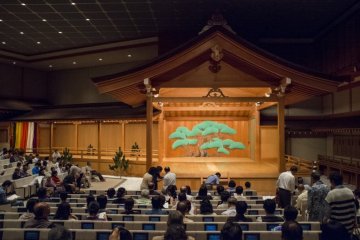
The National Noh Theater is located in Shibuya City, a mere three minutes walk from Shinjuku Gyoen National Garden. Opened in 1983, the facility is run by the Japan Arts Council and hosts various noh, kyogen, kabuki, and bunraku performances throughout the year. The nearly 600-seat theater is composed primarily of wood and features an elegant 400-year-old cypress stage with a pine tree painted on the back, which is customary for noh stages. The facility also includes a rehearsal stage, lecture room, and reference library, as well as an exhibition area called the Traditional Performing Arts Information Centre. This center is located on the first floor and displays costumes, props, and ukiyo-e woodblock prints. It is free to enter and is open from 10:00–18:00. You can purchase tickets online, reserve them by phone, or buy them at the theater. Noh is a traditional form of Japanese theater that uses music, dance, gestures, masks, and elaborate costumes to tell a story that is often related to legends and history. Kyogen, on the other hand, is a comedic performance that relies on witty dialogue to make the audience laugh. The combination of the two, in which kyogen is performed during breaks in the noh performance, is called nogaku and is recognized as an UNESCO Intangible Cultural Property. Kabuki is another form of traditional theater that utilizes song and dance for storytelling, and bunraku is a type of Japanese puppet theater.

The venue for the gymnastics and water polo competitions during the 1964 Tokyo Olympics, the Tokyo Metropolitan Gymnasium continues to be an important sporting facility for the city today. It will host the table tennis competition during the 2020 Olympic and Paralympic Games. The site has an interesting history. It was once owned by Iemasa Tokugawa (1884 to 1963), a politician and diplomat, and the 17th hereditary head of the famous Tokugawa shogunal family. The Tokyo government purchased the land and buildings in 1943, it was then used by US military officers for some years following the Second World War. After the site passed back into the hands of the Tokyo government in 1952, all the former wooden buildings were torn down and a modern concrete gymnasium was finished in 1956. The facility underwent a complete renovation between 1986 and 1990 and the city has continued to make additions and improvements over the years. The main arena can seat up to 10,000 people. The gymnasium has hosted both national and international sporting competitions in diverse sports, such as volleyball, wrestling, and figure skating. Since 2000, the arena has also been used for concerts and Katy Perry performed there in 2015. A new kind of system for managing the gymnasium was instigated by the Tokyo government in 2006, with Tokyo Sport Benefits Corporation being the current designated manager. Some of the facilities, including the swimming pool, training room, and athletic fields are usually open for use by the public. However, please note these are currently closed due to preparations for the 2020 Tokyo Olympic and Paralympic Games.
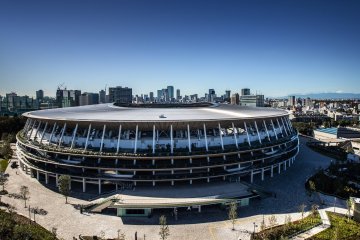
The National Stadium was used as the main stadium for the 1964 Tokyo Olympics and was then converted into a brand new stadium for the next Tokyo Olympics and Paralympic Games. It is located in Kasumigaoka, Shinjuku District, where the Olympic opening and closing ceremonies will be held and Paralympic Games, as well as athletics and football matches, after which the stadium will be used for sporting and cultural events.The stadium has a capacity of 68,089 seats. There is a park landscape with lots of trees around the stadium. The open facade is fitted with greenery all around and is intended to promote ventilation of the interior of the stadium. During the construction, attention was paid to the use of natural materials such as wood. This, which comes from 47 prefectures in the country, was also used for the roof construction, the facade, as well as for the changing rooms and boxes.